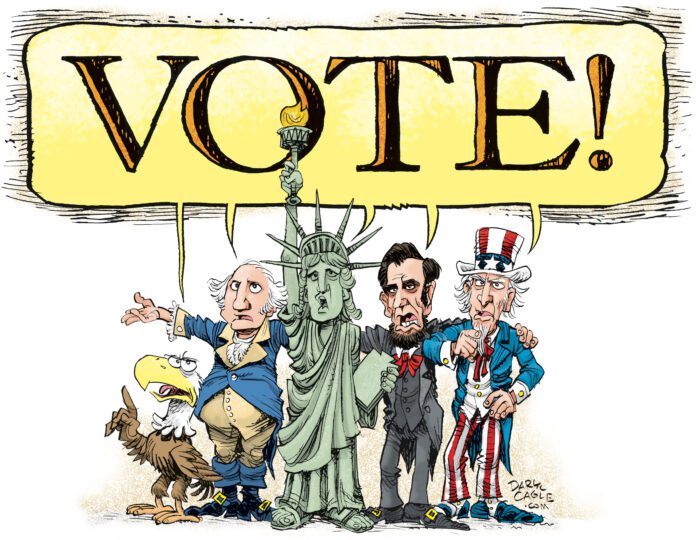So, something big happenin’ Tuesday?
That’s a joke, of course. You’d have to be in a years-long coma not to know America will choose a president that day.
Additionally, Oklahoma voters will decide whether three state Supreme Court justices, three Court of Criminal Appeals judges, and six Court of Civil Appeals judges continue serving. And the fate of two dubious state questions sent directly to the ballot by the Oklahoma Legislature.
All are important. All require us to perform our civic duty. To thoroughly vet the candidates and issues.
Good news: There were long lines last week for in-person early voting – a record-breaking 292,455 ballots cast ahead of election day. Bad news: One-quarter of age-eligible Oklahomans still aren’t even registered to vote.
More bad news: It’s cause for celebration when voter turnout exceeds just one-half – 50% – of those registered. Good grief – that’s only about one-third of those old enough to cast ballots.
Which means a minority of Oklahomans are deciding who helps shape important public policy and manage vital state services. Classic example: Gov. Kevin Stitt was re-elected in 2020 with just 639,484 votes – 28% of registered voters.
We Americans love to puff our chests and proclaim our democracy to be the world’s envy. Perhaps it’s time for a reality check.
In November 2022, the Pew Research Center reported voter turnout in the 2020 presidential election “soared to levels not seen in decades” – 158.4 million cast ballots, 62.8% of the voting age population.
Terrific, right! Uh, no. When comparing that turnout to recent national elections in 49 other OECD [Organization for Economic Cooperation and Development] countries, the U.S. ranked 31st – firmly entrenched between Colombia [62.5%] and Greece [63.5%]. And nowhere near Uruguay’s 90.1% voting-age-population turnout, Turkey’s 86.2%, and Indonesia’s 82%.
For our system to work, it’s necessary for citizens to perform their civic duties. To pay attention to not just what the candidates say when running for office, but what they do once elected. To hold them accountable in the next election. To engage in critical thinking, not political tribalism.
My dear friend, the late Oklahoma Journalism Hall of Famer Frosty Troy, put it best: “It’s the price we pay to live in this country.” Of course, he also would point out: “People don’t think we can lose this country, but we can.”
It’s time – past time, really – for structural changes that encourage civic engagement. Eliminating straight party voting would spur voters to study all the candidates. So would open primaries.
Creating a non-partisan redistricting commission to draw legislative and congressional district boundaries would end the partisan gerrymandering that results in too many elections being decided in closed primaries.
A grass roots effort to get an initiative on the ballot to do just that was derailed when COVID struck. But momentum now builds for a separate initiative aimed at creating open primaries – all candidates, regardless of party, appearing on one primary ballot, with the top two vote-getters vying in the general election.
That doesn’t set well with the hardest-right Republicans who like the system the way it is. Nor with many Democrats who fear current legislative and congressional boundaries could result in two Republicans on the general election ballot.
But it’s also possible open primaries would force candidates to appeal more to broader constituencies and less to the rabid, far-right GOP minority that currently wields outsize influence in the nominating process.
In the meantime, civic duty calls: Vote!







